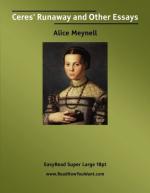Not a town, not a village, not a solitary cottage during the English Middle Ages was unvisited by him who frightened the children; they had a name for him as for the wild birds—Robin Redbreast, Dicky Swallow, Philip Sparrow, Tom Tit, Tom-a-Bedlam. And after him came the “Abram men,” who were sane parodies of the crazed, and went to the fairs and wakes in motley. Evelyn says of a fop: “All his body was dressed like a maypole, or a Tom-a-Bedlam’s cap.” But after the Civil Wars they vanished, and no man knew how. In time old men remembered them only to remember that they had not seen any such companies or solitary wanderers of late years.
The mad maid of the poets is a vagrant too, when she is free, and not singing within Bedlam early in the morning, “in the spring.” Wordsworth, who dealt with the legendary fancy in his “Ruth,” makes the crazed one a wanderer in the hills whom a traveller might see by chance, rare as an Oread, and nearly as wild as Echo herself:-
I too have passed her in the hills
Setting her little water-mills.
His heart misgives him to think of the rheumatism that must befall in such a way of living; and his grave sense of civilization, bourgeois in the humane and noble way that is his own, restores her after death to the company of man, to the “holy bell,” which Shakespeare’s Duke remembered in banishment, and to the congregation and their “Christian psalm.”
The older poets were less responsible, less serious and more sad, than Wordsworth, when they in turn were touched by the fancy of the maid crazed by love. They left her to her light immortality; and she might be drenched in dews; they would not desire to reconcile nor bury her. She might have her hair torn by the bramble, but her heart was light after trouble. “Many light hearts and wings”—she had at least the bird’s heart, and the poet lent to her voice the wings of his verses.
There is nothing in our poetry less modern than she. The vagrant woman of later feeling was rather the sane creature of Ebenezer Elliott’s fine lines in “The Excursion”—
Bone-weary, many-childed, trouble-tried!
Wife of my bosom, wedded to my soul!
Trouble did not “try” the Elizabethan wild one, it undid her. She had no child, or if there had ever been a child of hers, she had long forgotten how it died. She hailed the wayfarer, who was more weary than she, with a song; she haunted the cheerful dawn; her “good-morrow” rings from Herrick’s poem, fresh as cock-crow. She knows that her love is dead, and her perplexity has regard rather to the many kinds of flowers than to the old story of his death; they distract her in the splendid meadows.




